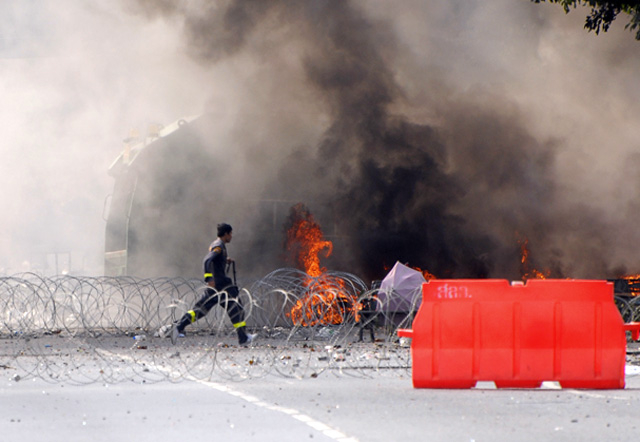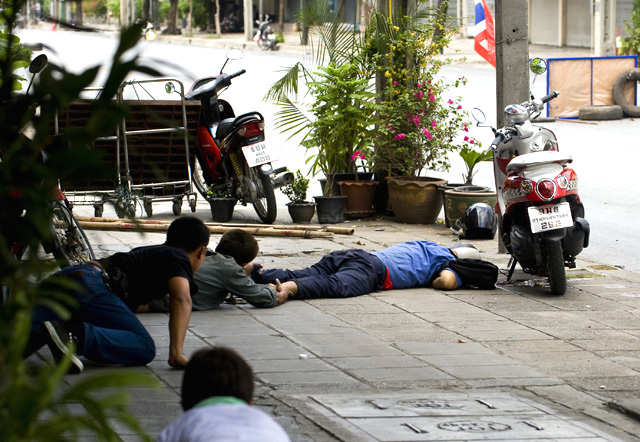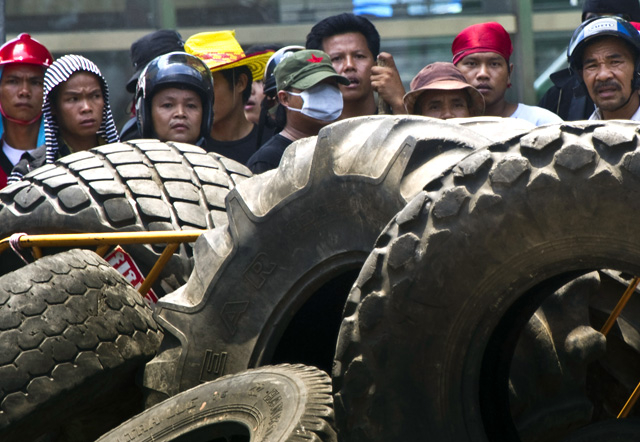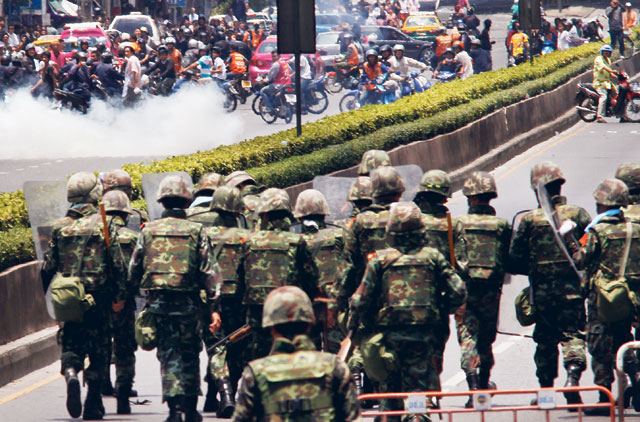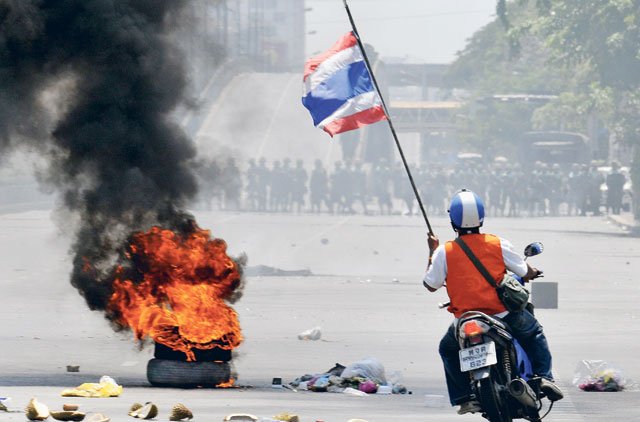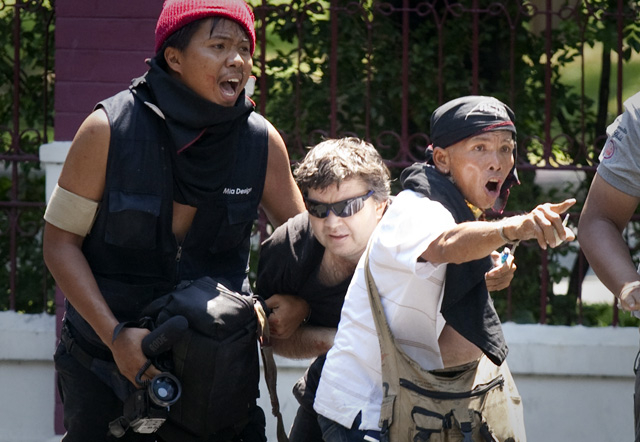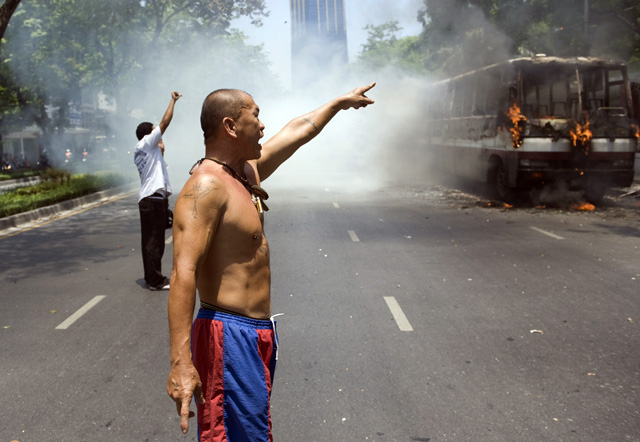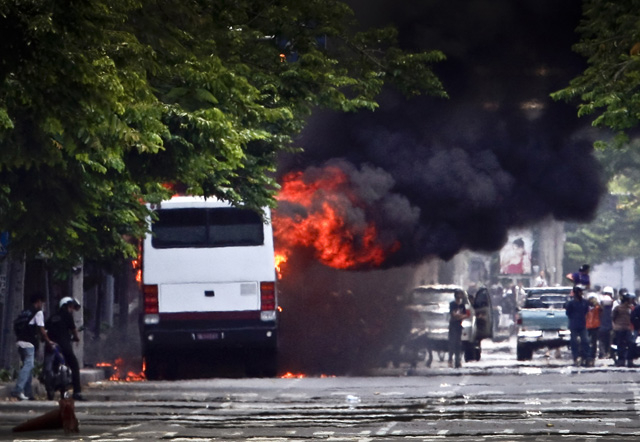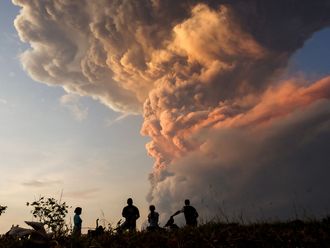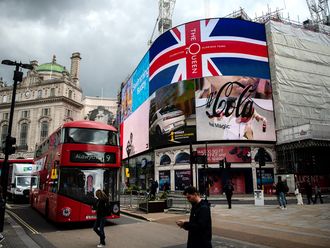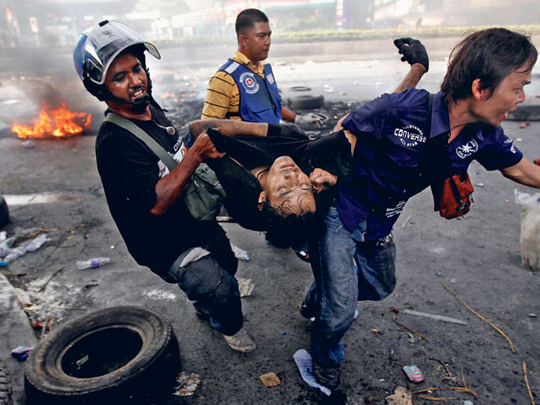
Bangkok: Raging violence in the heart of the Thai capital claimed eight more lives on Saturday as the army threatened a crackdown on thousands of protesters.
Two days of street battles between soldiers and anti-government "Red Shirts" have left 24 people dead, all civilians, and 187 wounded. The army declared one area of Bangkok a "live fire zone".
Scenes of urban warfare erupted on the southern and northern fringes of the Red Shirts' encampment in the heart of Bangkok, after the army moved in Thursday to seal off the area.
Prime Minister Abhisit Vejjajiva, who last week shelved a plan to hold early elections because the protesters refused to disperse, warned the government "cannot turn back" in the two-month standoff.
Open fire
Soldiers opened fire on demonstrators, some armed or hurling Molotov cocktails, as plumes of black smoke billowed from burning tyres. Three bodies were seen lying on the ground in the area where the military posted a sign declaring live ammunition was being used, according to an AFP photographer.
More than 50 people have been killed so far and 1,628 wounded in the protests.
"The current situation is almost full civil war," said a protest leader, Jatuporn Prompan. "I am not sure how this conflict will end."
Tyres, apparently set alight by demonstrators, were burning in an area where troops opened fire on protesters on Friday near their vast fortified encampment.
It was not clear who was doing the shooting, said an AFP reporter at the scene, as soldiers ran to take up positions after an explosion near the Suan Lum Night Bazaar, a market and dining area normally popular with tourists.
Government troops have blocked roads and set up checkpoints to seal off the area around the wider protest site, which extends for several square kilometres.
The protesters, who are trying to bring down the government of Prime Minister Abhisit Vejjajiva, threw stones, used slingshots and launched fireworks at the troops as the two-month standoff descended into more violence.
UAE issues travel warning
UAE citizens have been advised to avoid travel to Thailand until the situation improves in Bangkok, WAM reported quoting Sultan Al Ali, head of media affairs at the Ministry of Foreign Affairs. He added that the ministry is in contact with the UAE embassy in Bangkok to maintain contact with nationals who are already there.
Death toll
A total of 24 people - all of them Thais - were known to have died since the fresh wave of violence began, according to the official Erawan emergency centre.
The centre said 141 people had been injured, three of them foreigners, whom it identified as being from Canada, Myanmar and Poland. No details were given of their condition.
The France 24 television station said one of its journalists - a Canadian - had been shot and wounded covering the arrest, while two Thai reporters were also amongst the injured. A Japanese cameraman was killed in Bangkok last month.
Government spokesman Panitan Wattanayagorn said troops had come under attack as they moved to seal off the rally area to prevent more Red Shirts from entering.
"The soldiers... had no choice but to respond to these attacks," Panitan told reporters Friday. Troops were authorised to use live ammunition in self-defence, for warning shots or against armed gunmen, he added.
Troops would step up security measures in the coming days to search for weapons and reduce the number of people entering the area, he said, warning of the risk of more instability in the capital.
The United States called for restraint on all sides.
"We are deeply concerned about the situation on the ground in Thailand," State Department spokesman Philip Crowley told reporters.
"We continue to strongly encourage everyone involved... to show restraint and to find a way to work peacefully through these differences and do so in a way that strengthens democratic institutions," Crowley added.
UN Secretary General Ban Ki-moon said he was following the rapidly mounting violence and tensions in Thailand with "growing concern".
"He appeals to both the protesters and the Thai authorities to do all in their power to avoid further violence and loss of life," Ban's press service said in a statement.
"He strongly encourages them to urgently return to dialogue in order to de-escalate the situation and resolve matters peacefully," it said.
The violence came after Abhisit shelved a plan to hold early elections in November after reconciliation efforts broke down.
The mostly poor and working class Reds consider Abhisit's government illegitimate because it came to power in a 2008 parliamentary vote after a court ruling ousted elected allies of their hero, former premier Thaksin Shinawatra.
Thaksin, who was unseated in a 2006 coup and now lives in self-imposed exile to avoid a jail term for corruption, called on the government to pull back troops and restart negotiations with the demonstrators.
"The government's actions clearly constitute grave infringement of human rights and criminal offences," he said in a statement.
Defence Minister General Prawit Wongsuwon said the military operation was meant to force the movement's leaders back to talks with the government.
At least 46 people have been killed and about 1,100 injured in Bangkok in a series of confrontations and attacks since the protests began in mid-March.
Almost one-third of Thailand, including Bangkok, is now under emergency rule.
Power base: Middle class support
- The Red Shirts are made up mainly of members of the rural poor and urban working classes. Many are supporters of the fugitive, twice-elected former prime minister Thaksin Shinawatra, to whom they remain loyal because of his mould-breaking populist policies while in office from 2001-2006.
- They say they are fighting against intervention in politics and the judicial system by unelected conservative elites, who they accuse of operating with impunity and conspiring to topple democratically elected governments.
- The UDD believes the 2006 coup against Thaksin, his graft conviction in absentia and the dissolution of his Thai Rak Thai Party and its next incarnation, the People's Power Party (PPP), were all masterminded by his influential opponents.
- The Red Shirts have proved to be a well organised and powerful extra-parliamentary force, holding regular protests in Bangkok and in their northern and northeastern strongholds, which attract tens of thousands of people, lasting days, if not weeks.
- They occupied the headquarters of the government for three weeks in April 2009 and simultaneously shut down a summit of Asian leaders two hours away in the beach resort of Pattaya.
- They have occupied a site covering roughly 3 square km of a luxury hotel and shopping district for a month in an eight-week protest that reached its peak on March 14 with 150,000 protesters, most flooding into Bangkok from far-flung provinces.
- The UDD has scores of "politics schools" across the country and organisations at national, provincial, district and village levels, responsible for fund-raising and recruiting.
- The group has its own television channel, magazine, websites, radio stations, merchandise shops and music album. Red Shirts also carry their own UDD identification cards. Protest sites have masseuses, infirmaries, showers, canteens and dozens of vendors selling snacks, cigarettes, T-shirts and coffee.
— Reuters
What do you think is the solution to this issue? How can the government intervene and stop the unrest?


